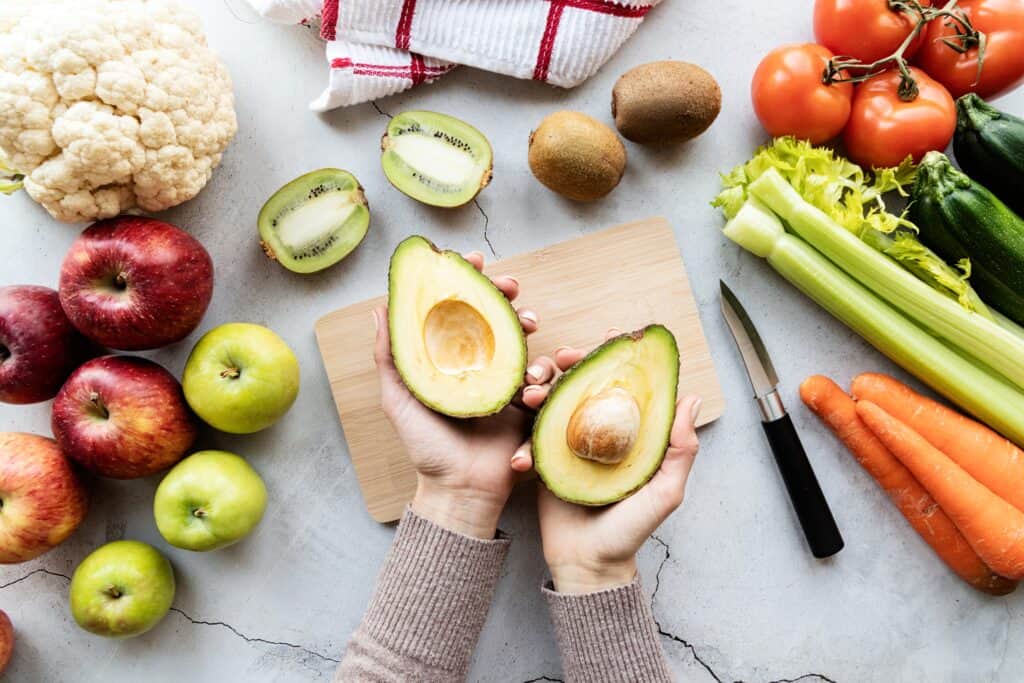Diet to Lose Weight The Ultimate Weight Loss Guide
Are you looking to shed some extra pounds and get in shape? If so, you’re not alone. Losing weight is a common goal for many people, but it can be challenging to know where to start.
The key to successful weight loss is a combination of healthy eating habits and regular exercise. In this comprehensive guide, we will focus on the diet to lose weight. We’ll provide you with all the information you need to create a solid plan and achieve your weight loss goals.
From understanding calories to choosing the right foods and portion control, we’ll cover it all.
So, grab a notebook and pen, and let’s get started!

Understanding Calories
Understanding calories is crucial when it comes to losing weight. In simple terms, a calorie is a unit of measurement for energy. The food we eat contains calories, and our bodies use these calories for energy to perform various functions, such as breathing, digesting food, and physical activity.
When we consume more calories than our bodies need, the excess calories are stored as fat, leading to weight gain. To lose weight, we need to create a calorie deficit, which means consuming fewer calories than we burn. This can be achieved by reducing our calorie intake, increasing physical activity, or a combination of both.
Calculating Your Daily Calorie Intake
Calculating your daily calorie intake is an essential step in creating a calorie deficit. To do this, you need to know your basal metabolic rate (BMR), which is the number of calories your body needs to maintain its current weight. Factors that affect your BMR include age, gender, height, weight, and activity level.
Once you know your BMR, you can determine how many calories you need to consume to lose weight. A safe and healthy rate of weight loss is around 1-2 pounds per week, which requires a calorie deficit of 500-1000 calories per day.
It’s essential to note that not all calories are created equal. The quality of the calories we consume also matters. For example, 100 calories of vegetables will provide our bodies with more nutrients and fiber than 100 calories of sugary snacks.
Foods to Eat
What you eat is crucial when it comes to losing weight. You should focus on eating nutrient-dense foods that provide your body with the energy it needs to function correctly.

Protein
Protein is an essential nutrient that plays a crucial role in weight loss. It is made up of amino acids, which are the building blocks of our bodies. When we consume protein, our bodies break it down into amino acids, which are then used to build and repair tissues, including muscle tissue.
One of the benefits of consuming protein is that it can help you feel full for longer periods. This is because protein takes longer to digest than carbohydrates or fats, so it can help keep you feeling satisfied and prevent overeating.
Another benefit of protein is that it helps maintain muscle mass, which is important when losing weight. When we lose weight, we often lose both fat and muscle. However, by consuming adequate protein, we can help preserve our muscle mass and prevent muscle loss.
Some excellent sources of protein include meat, poultry, fish, eggs, beans, and nuts. It’s important to choose lean protein sources and limit high-fat options, such as fatty cuts of meat.
When trying to lose weight, it’s recommended to consume around 0.8-1 gram of protein per pound of body weight. This can help support muscle maintenance and aid in weight loss. However, it’s essential to remember that protein should be part of a balanced diet that includes a variety of other nutrients.
Fruits and Vegetables
Fruits and vegetables are an essential part of any healthy diet, and they are particularly beneficial when it comes to weight loss. They are low in calories and high in fiber, which can help you feel full and satisfied without consuming excess calories.
Fiber is an important nutrient that is found in fruits and vegetables. It is a type of carbohydrate that is not absorbed by the body, which means it doesn’t provide calories. However, it helps keep our digestive system healthy and can aid in weight loss by helping us feel full.
In addition to being low in calories and high in fiber, fruits and vegetables are also rich in vitamins and minerals that our bodies need to function correctly. They are excellent sources of vitamin C, vitamin A, and potassium, among other essential nutrients.
To get the most benefits from fruits and vegetables, it’s essential to eat a variety of colors and types. Dark leafy greens, such as kale and spinach, are excellent sources of fiber and vitamins, while fruits such as berries and apples provide natural sweetness and important nutrients.
When incorporating fruits and vegetables into your diet, aim to fill at least half of your plate with them at each meal. This can help you increase your intake of these essential nutrients while also promoting weight loss.
Whole Grains
Whole grains are an important part of a healthy diet, and they can be particularly beneficial when it comes to weight loss. Unlike refined grains, which have had the bran and germ removed, whole grains contain all parts of the grain, including the fiber-rich bran and the nutrient-rich germ.
One of the benefits of consuming whole grains is that they are an excellent source of fiber. Fiber is a type of carbohydrate that is not digested by the body, which means it doesn’t provide calories. However, it helps keep our digestive system healthy and can help us feel full for longer periods, which can aid in weight loss.
In addition to being a good source of fiber, whole grains also contain important vitamins and minerals that our bodies need to function correctly. These include B vitamins, iron, and zinc, among others.
Some examples of whole grains include brown rice, quinoa, whole wheat bread, and oatmeal. When choosing whole grains, it’s essential to look for products that contain 100% whole grains and to avoid products that are labeled “enriched” or “refined.”
When incorporating whole grains into your diet, aim to make at least half of your grain servings whole grains. This can help increase your intake of fiber and other essential nutrients while also promoting weight loss.
Healthy Fats
Healthy fats are an important part of a balanced diet, and they can be beneficial when it comes to weight loss. Unlike unhealthy fats, such as trans fats, healthy fats provide important nutrients and can support overall health.
One of the benefits of consuming healthy fats is that they can help reduce inflammation in the body. Chronic inflammation has been linked to a variety of health problems, including heart disease, cancer, and diabetes. Healthy fats, such as those found in nuts, seeds, and fatty fish, can help reduce inflammation and support overall health.
In addition to reducing inflammation, healthy fats can also improve heart health. Research has shown that consuming healthy fats, such as those found in olive oil and avocados, can help lower cholesterol levels and reduce the risk of heart disease.
Some examples of healthy fats include nuts, seeds, avocados, olive oil, fatty fish, and coconut oil. When incorporating healthy fats into your diet, it’s important to choose high-quality sources and to consume them in moderation.
It’s also important to remember that while healthy fats can be beneficial when trying to lose weight, they are still high in calories. Therefore, it’s essential to incorporate them into a balanced diet that includes a variety of other nutrients.
Foods to Avoid
When trying to lose weight, it’s important to be mindful of the types of foods you are consuming. Certain foods can contribute to weight gain and should be avoided or limited.

Sugary Drinks
One category of foods to avoid is sugary drinks. These include soda, juice, energy drinks, and sports drinks. Sugary drinks are high in calories and sugar, which can lead to weight gain and other health problems, such as type 2 diabetes and heart disease.
In addition to sugary drinks, it’s also important to limit your intake of processed and high-fat foods. These include foods such as chips, candy, and fast food. These foods are often high in calories and low in nutrients, which can make it difficult to achieve weight loss goals.
Another food to avoid or limit when trying to lose weight is refined carbohydrates. These include foods such as white bread, white rice, and pasta. Refined carbohydrates are often low in fiber and can cause spikes in blood sugar, which can lead to cravings and overeating.
It’s also important to be mindful of portion sizes when consuming any type of food. Even healthy foods can contribute to weight gain if consumed in excess. Aim to eat balanced meals with a variety of nutrient-dense foods, and listen to your body’s hunger and fullness signals.
Processed Foods
Processed foods are a common type of food found in many modern diets. These foods are often convenient and readily available, but they can be detrimental to our health, particularly when it comes to weight loss.
Processed foods are typically high in calories, unhealthy fats, and added sugars. They are often low in fiber and other essential nutrients, which can lead to overeating and weight gain. Additionally, the added sugars found in many processed foods can cause blood sugar spikes and crashes, which can lead to cravings and overeating.
Some examples of processed foods include chips, cookies, candy, frozen dinners, and fast food. These foods are often high in calories and low in nutrients, which can make it difficult to achieve weight loss goals.
When trying to lose weight, it’s important to be mindful of the types of foods you are consuming. Processed foods should be limited or avoided as much as possible, and instead, emphasis should be placed on consuming nutrient-dense, whole foods.
If you do choose to consume processed foods, it’s essential to read food labels carefully and choose options with lower amounts of added sugars, unhealthy fats, and calories. Additionally, be mindful of portion sizes and try to balance out processed foods with healthier options such as fruits, vegetables, and lean proteins.
Fast Food
Fast food is a popular type of food that is often consumed for its convenience and affordability. However, it’s important to be aware of the negative impact fast food can have on our health, particularly when it comes to weight loss.
Fast food is typically high in calories, unhealthy fats, and added sugars. Many fast food meals also lack essential nutrients, such as fiber, vitamins, and minerals, which can lead to overeating and weight gain. Additionally, the large portion sizes often found in fast food meals can contribute to excess calorie intake.
Some examples of fast food include burgers, fries, pizza, and fried chicken. While it’s possible to make healthier choices at fast food restaurants, such as opting for grilled options or choosing a side salad instead of fries, it can still be challenging to find nutrient-dense options that support weight loss goals.
When trying to lose weight, it’s important to limit or avoid fast food as much as possible. Instead, focus on consuming whole, nutrient-dense foods, such as fruits, vegetables, lean proteins, and whole grains. Meal planning and preparation can also be helpful in avoiding fast food and ensuring that you have healthy options readily available.
Portion Control
Portion control is a crucial aspect of weight loss. When we consume more calories than we burn, we gain weight, and portion control can help us manage our calorie intake.
One effective way to control portion sizes is to aim to eat smaller, more frequent meals throughout the day. This can help prevent overeating at mealtimes and keep our metabolism active throughout the day. Additionally, by consuming smaller portions, we can reduce our overall calorie intake and support weight loss.
Using a Food Scale
Another helpful tool for portion control is using a food scale. A food scale allows you to accurately measure your food and ensure you are eating the correct portion sizes. This can be particularly helpful when it comes to calorie-dense foods, such as meats, nuts, and grains.
It’s also important to be mindful of portion sizes when eating out at restaurants or consuming pre-packaged foods. These foods often contain larger portion sizes than necessary, which can contribute to excess calorie intake.
When trying to lose weight, it’s recommended to aim for a balanced diet that includes a variety of nutrient-dense foods. By being mindful of portion sizes and consuming smaller, more frequent meals throughout the day, we can support weight loss goals while still ensuring our bodies are getting the essential nutrients they need.
Meal Planning
Meal planning is a helpful strategy when it comes to weight loss. By planning your meals in advance, you can ensure that you are consuming nutrient-dense foods that support your weight loss goals.
One of the benefits of meal planning is that it can help you avoid making unhealthy food choices when you are hungry and pressed for time. When we are hungry and don’t have a plan for our next meal, it can be easy to reach for convenient, calorie-dense foods that aren’t supportive of our weight loss goals. By planning ahead, we can ensure that we have healthy meals and snacks readily available, making it easier to stick to our diet plan.
Preparing Meals in Advance
Preparing meals in advance is another helpful tool for weight loss. This can involve cooking meals in bulk and storing them in the fridge or freezer for later consumption. This can be particularly helpful when you have a busy schedule and limited time to prepare meals during the week.
When meal planning, it’s essential to aim for a balanced diet that includes a variety of nutrient-dense foods. This can include lean proteins, whole grains, fruits, vegetables, and healthy fats. By incorporating a variety of foods into your meal plan, you can ensure that your body is getting the essential nutrients it needs to function correctly.
Exercise
Exercise is an essential component of weight loss. It helps you burn calories, build muscle, and improve your overall health.

Cardio
One type of exercise that is particularly beneficial for weight loss is cardio. Cardiovascular exercise, such as running, cycling, or swimming, can help you burn calories and improve your heart health. These types of exercises increase your heart rate and require sustained effort, which can lead to significant calorie burn.
Strength Training
Another type of exercise that is important for weight loss is strength training. Strength training, such as weightlifting, can help build muscle mass, which can increase your metabolism and help you burn more calories even when at rest. Additionally, building muscle can help improve body composition, making you look leaner and more toned.
Incorporating a variety of exercises into your routine can also help prevent boredom and improve overall fitness. It’s important to aim for at least 150 minutes of moderate-intensity exercise per week, or 75 minutes of vigorous-intensity exercise per week, according to the American Heart Association.
In addition to helping with weight loss, exercise has numerous other health benefits. It can help reduce the risk of chronic diseases such as heart disease, type 2 diabetes, and certain types of cancer. Exercise can also help improve mood and reduce stress levels.
Start Your Diet to Lose Weight Journey Today
Losing weight can be a challenging and complex process, but it is achievable with the right plan and approach. A healthy diet that includes nutrient-dense foods such as fruits, vegetables, whole grains, and lean proteins is essential for weight loss. Portion control and meal planning can also help manage calorie intake and avoid unhealthy food choices. Additionally, incorporating exercise into your routine can help burn calories, build muscle, and improve overall health.
It’s important to remember that weight loss is not a one-size-fits-all approach, and what works for one person may not work for another. It’s essential to find a plan that works for you and fits your lifestyle and preferences. Consulting with Dr. Nancie and Dr. Alphonso can also be helpful in developing a personalized weight loss plan.
By following a balanced diet, practicing portion control, and incorporating exercise into your routine, you can achieve your weight loss goals and improve overall health. Remember to be patient and persistent, as sustainable weight loss takes time and effort. With dedication and a positive mindset, you can reach your goals and live a healthier, happier life.
FAQs
- Can I eat carbs when trying to lose weight?
Yes, you can eat carbs when trying to lose weight, but it’s essential to choose the right type of carbohydrates. Whole grains, fruits, and vegetables are excellent sources of carbs that can provide your body with the energy it needs without contributing to weight gain.
- Is it okay to skip meals when trying to lose weight?
Skipping meals is not recommended when trying to lose weight. It can lead to overeating later in the day and slow down your metabolism. Instead, focus on eating smaller, more frequent meals throughout the day to keep your metabolism running efficiently.
- Can I eat fast food occasionally while on a weight loss diet?
It’s okay to indulge in fast food occasionally, but it should not be a regular part of your diet. Fast food is often high in calories and low in nutrients, making it an unhealthy choice for weight loss.
- How much weight can I expect to lose in a week?
The amount of weight you can expect to lose in a week depends on various factors, such as your starting weight, diet, and exercise routine. Generally, a safe and healthy amount of weight loss is 1-2 pounds per week.
- Do I need to cut out all fats from my diet when trying to lose weight?
No, you don’t need to cut out all fats from your diet when trying to lose weight. Healthy fats, such as those found in nuts, avocados, and olive oil, are essential for overall health and can actually aid in weight loss. However, it’s important to limit unhealthy fats found in processed foods and fried foods.
What To Do Next…
For people who want to stop struggling with their weight

We Now Have FDA Approved Semaglutide Weight Loss in Sarasota and Bradenton Florida. Book a free consultation and find out about the semaglutide cost and semaglutide side effects. Semaglutide injection are available after your free consultation.






